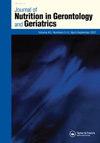Does a High-Energy High-Protein Diet Reduce Unintentional Weight Loss in Residential Aged Care Residents?
Q3 Medicine
Journal of Nutrition in Gerontology and Geriatrics
Pub Date : 2019-11-26
DOI:10.1080/21551197.2019.1691108
引用次数: 5
Abstract
Abstract Malnutrition and unintentional weight loss are known to occur in residential aged care facilities (RACFs). The use of oral nutritional supplements (ONS) and high-energy high-protein (HEHP) diets are two foodservice strategies that may be implemented in efforts to reduce unintentional weight loss in RACFs. This observational study aimed to determine whether incorporation of a structured high-energy high-protein diet (sHEHP) into the standard menu could reduce unintentional weight loss in RACF residents. RACFs in this study were facilities that provide long-term care to older adult residents. Weight change, body mass index and subjective global assessment scores of participants were measured at baseline and at six months across five RACFs receiving usual care with ONS or a sHEHP diet. Groups were different at baseline, with a high prevalence of severe malnutrition observed in the ONS group. Over the six-month period, there was a small but statistically significant difference in weight change within the groups: −1.64 ± 3.62 kg, ONS group; 0.56 ± 2.76 kg, sHEHP group, P = 0.0004. Both approaches investigated are feasible, however, future research using high-quality methods is needed to determine the most effective approach to deliver best practice nutrition care for residents into the future.高能量高蛋白饮食是否能减少老年居民的意外体重下降?
营养不良和无意体重减轻是已知发生在住宅养老机构(racf)。口服营养补充剂(ONS)和高能量高蛋白(HEHP)饮食的使用是两种食品服务策略,可用于减少racf意外体重减轻的努力。本观察性研究旨在确定将结构化高能量高蛋白饮食(sHEHP)纳入标准菜单是否可以减少RACF居民的意外体重减轻。本研究中的racf是为老年居民提供长期护理的设施。在基线和六个月时,在五个接受ONS或sHEHP饮食常规护理的racf中,测量参与者的体重变化、体重指数和主观总体评估分数。各组在基线时不同,在ONS组中观察到严重营养不良的高发率。6个月期间,各组体重变化差异虽小但有统计学意义:ONS组为−1.64±3.62 kg;0.56±2.76 kg, sHEHP组,P = 0.0004。这两种方法都是可行的,然而,未来的研究需要使用高质量的方法来确定最有效的方法,为未来的居民提供最佳的营养护理实践。
本文章由计算机程序翻译,如有差异,请以英文原文为准。
求助全文
约1分钟内获得全文
求助全文
来源期刊

Journal of Nutrition in Gerontology and Geriatrics
Nursing-Nutrition and Dietetics
CiteScore
2.20
自引率
0.00%
发文量
13
期刊介绍:
The Journal of Nutrition in Gerontology and Geriatrics publishes original research studies that are directly relevant to clinical and community nutrition issues that affect older adults. Epidemiologic and community-based studies are suitable for JNE, as are well-controlled clinical trials of preventive and therapeutic nutritional interventions. The Journal of Nutrition in Gerontology and Geriatrics invites papers on a broad array of topics in the nutrition and aging field, including but not limited to studies of: preventive nutrition, nutritional interventions for chronic disease, aging effects on nutritional requirements, nutritional status and dietary intake behaviors, nutritional frailty and functional status, usefulness of supplements, programmatic interventions, transitions in care and long term care, and community nutrition issues.
 求助内容:
求助内容: 应助结果提醒方式:
应助结果提醒方式:


